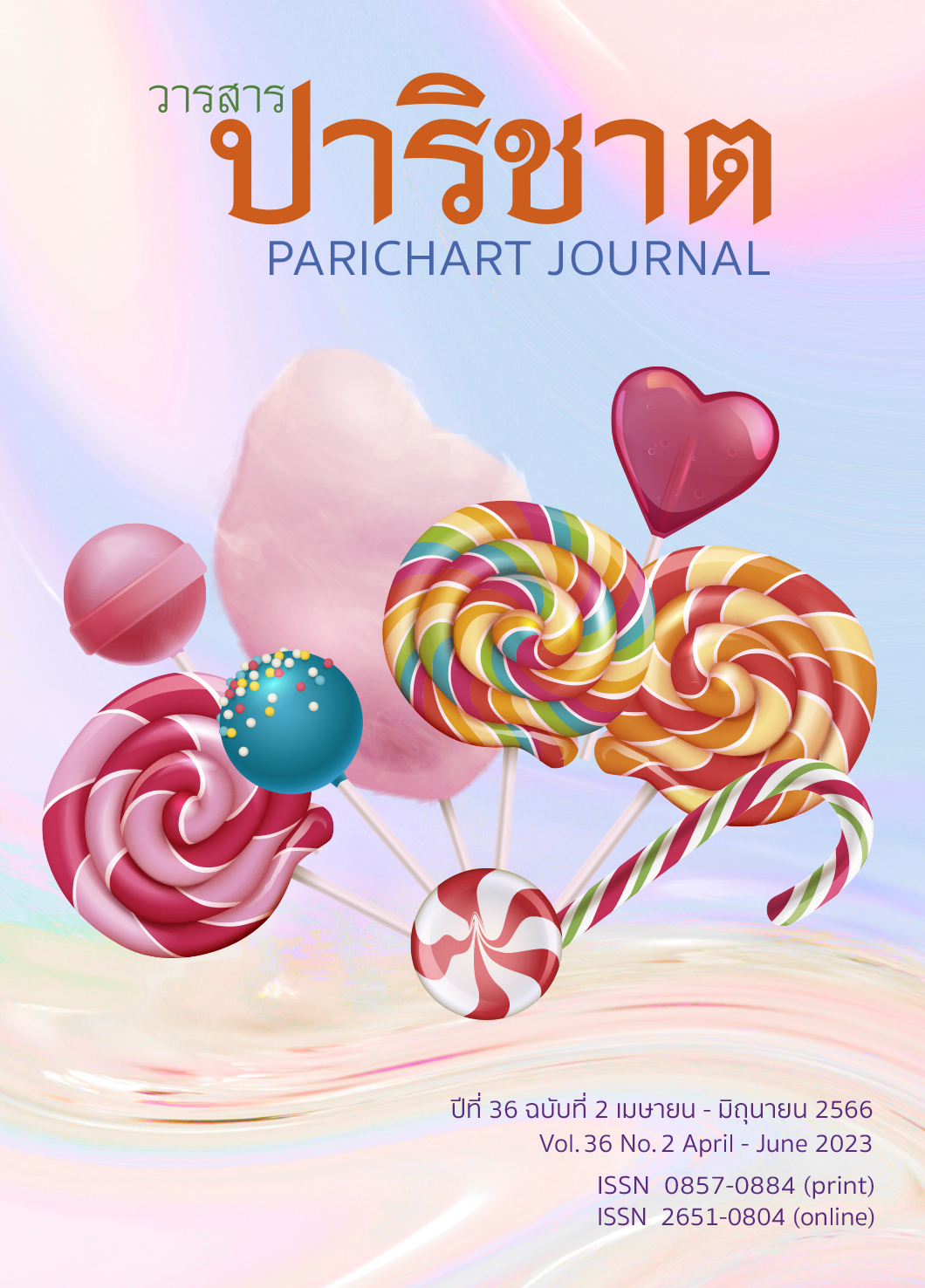The Perceptions of Thai Students Majoring in Korean on Indirect Speech Acts of Interrogatives in Korean
Main Article Content
Abstract
This research aimed to 1) compare the perceptions of intentions in indirect speech acts in interrogative sentences between Thai students and Koreans; 2) compare intermediate to high proficiency students’perceptions of intents in indirect speech acts of interrogatives to Korean Speakers’; and 3) explore the relationships between Thai students’ levels of Korean proficiency and their perceptions on intents in indirect speech acts of interrogatives. Multiple-choice questionnaires were used to gather data in this research. Samples consisted of 100 Thai students and 50 Koreans. The findings were as follows: 1) Thai students and Korean speakers showed statistically different perceptions of all intents expressed in indirect speech acts of interrogatives; 2) there was a statistically significant difference in the perceptions of all intents among high and intermediate proficiency students and native Koreans; however, when the differences were analyzed in pairs using Scheffe’s method, no statistically significant difference was found in the perceptions of intermediate proficiency students and high proficiency ones towards the intent of inviting; and 3) the students’ levels of Korean language proficiency and their perceptions of intents were significantly correlated at a moderate level of 0.663.
Article Details

This work is licensed under a Creative Commons Attribution-NonCommercial-NoDerivatives 4.0 International License.
References
Austin, J. L. (1962). How to Do Things with Words. Oxford University Press.
Lee, H. (2011). A Study on the Acquisition of Korean Modality by L1 Vietnamese Speakers. Korean Linguistics, n.d. (53), 335-360.
Lee, J. (2011). A Study on the Relationship between the Development of Grammatical and Pragmatical Competence in the Acquisition of Modality Expressions by Learners of Korean. Ph.D.'s thesis. Ewha Womans University.
Hong, S. (2010). A Study about developments of learner's cognition on Complaint speech act by Length of Residence. Master's thesis. Ewha Womans University.
Jang, S. (2012). A study on the acquisition of terms of address for Chinese learners of Korean language according to their Korean proficiency and the length of residence. Master's thesis. Ewha Womans University.
Lee, H. (2013). A Study of L 1 Thai Speakers’ understanding on Korean supposition expression. Bilingual Research, n.d. (53), 217-239. https://doi.org/10.17296/korbil.2013..53.217
Kim, S., & Kunghae, S. (2016). A Study on Thai-Speaking Korean Learners’ Understanding about Korean Passive Based on Pragmatic strategies. Bilingual Research, n.d. (63), 23-69. https://doi.org/10.17296/korbil.2016..63.23
Kunghae, S., & Hwang, S. (2017). A study on Awareness of Pragmatic Expression among Thai Korean Learners: Based on Grammatical Expressions and Conversation Expressions. Bilingual Research, (68), 27-57. https://doi.org/10.17296/korbil.2017..68.27
Park, Y. (2018). The Effect of Proficiency, Residence period, and Exposure Time on Thai Learners' Understanding of Korean Irony Expressions. Master 's thesis. Ewha Womans University.
Sahaviriya, K., & Kanghae, S. (2019). The Study of the Development Approach of the Korean Fundamental Grammars Textbook for Higher education studies in Thailand. Korean Section Eastern Languages Department Faculty of Humanities and Social Sciences Prince of Songkla University.
Choophol, K. (2017). Pragmatic Failure in Intercultural Communication of Chinese Speakers Who Have Thai as a Foreign Language. Dhonburi Rajabhat University. (in Thai)
Searle, J. R. (1969). Speech Acts. Cambridge : Cambridge University Press.
Hyoun, H. (2007). A Study on Correlation between Grammatical Pattern Expressions and their Pragmatic Functions. Bilingual Research, n.d. (34), 1-26. https://doi.org/10.17296/korbil.2007..34.1
Fan, H., & Bai, D. (2016). A Study on the Categories and Features of Directive Speech Acts in the Utterance of Teachers in Classrooms. The Society of Korean & Chinese Humanities, n.d. (53), 51-73.
Kullavanijaya, P. (1980). Speakers and yes-no questions. Journal of Letters, 12(1), 46-53.
Park, Y. (2011). Korean Pragmatics. Gyeonggi-do : Pagijong Press.
Lee, C. (1992). The nature of the question and the possibility of using it. Journal of the Yonsei Language and Literature, n.d. (24), 95-134.
Hinkle, D.E, William, W., & Stephen G.J. (1998). Applied Statistics for the Behavior Sciences (4thed). New York: Houghton Mifflin.
Sirirat, S. (2015). A Cross-Cultural Pragmatic Study of Compliment Speech Act Performance by Thai University Learners of Korean. Ph.D.'s thesis. Ewha Womans University.
Boonrung, S. (2007). A Study of Request Speech Act of Thai Korean Learners. Master's thesis. Ewha Womans University.
Phengsomboon, C. (2015). A study on the use aspect of apology strategies of Thai Learners of Korean. Master's thesis. Ewha Womans University.
Kunghae, S. (2018). A study on acquisition of negative questions in the Korean language by Thai learners from a perspective of cross-cultural pragmatics. Ph.D.'s thesis. Ewha Womans University.
Park, J. (2019). A study on the realization of the discourse functions of Korean interrogative Sentences. Ph.D.'s thesis. Yonsei University.
Lee, S. (1994). A Pragmatic study on modes of expressing intent. Ph.D.'s thesis. Seoul National University.
Chen, J. (2013). A Study on Teaching Indirect Speech Acts of Interrogatives for Chinese Korean Learners. Ph.D.'s thesis. Seoul National University.
Yang-Jiye. (2015). A study on Education Methods for Indirect Speech Acts of Negative Question in Korean. Master's thesis. Pusan National University.
Lee, E. (2004). The Grammar Description Method of Korean Language Textbooks. Bilingual Research, n.d. (25), 207-231.


